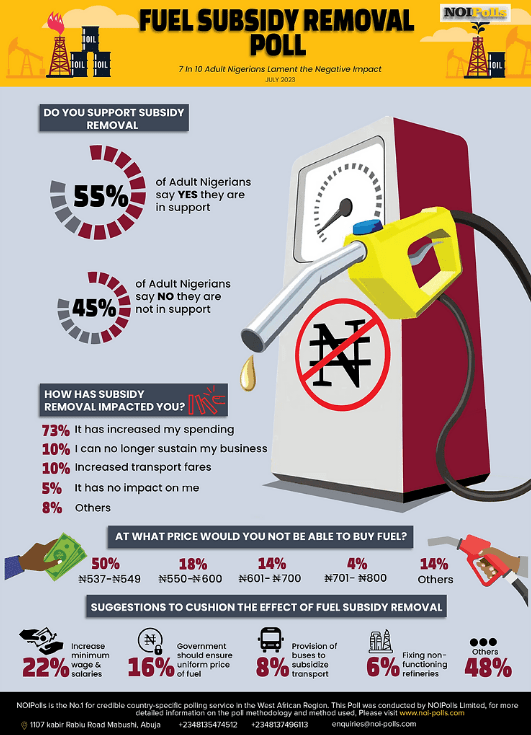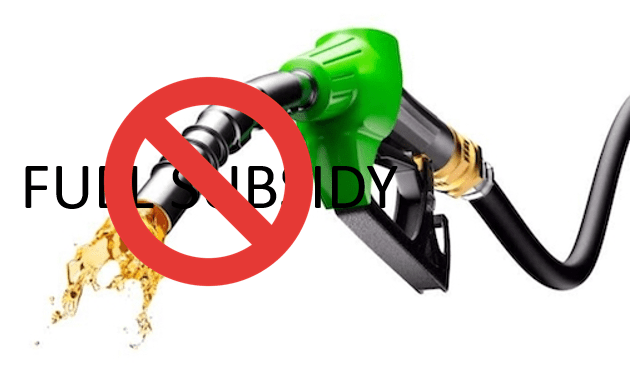Fuel subsidy removal has hurt 90% of businesses in Nigeria
Ninety percent of Nigerian businesses were negatively impacted by the elimination of fuel subsidies, which began in June 2023. This is supported by a recent report from the Fate Foundation titled “State of Entrepreneurship,” which included a survey of over 10,000 enterprises in all 36 states as well as the Federal Capital Territory.
The withdrawal of fuel subsidies in Nigeria is a complicated choice with wide-ranging consequences, according to expert commentary. Although there are advantages to it, such better fiscal health, more money, and better environmental effects, there are drawbacks as well, like inflation, social discontent, and possible harm to those with low incomes. Any decision to eliminate fuel subsidies ought to be supported by a well-planned plan that encourages sustainable economic growth and takes into account mitigating measures for the population that is most at risk.
Due to the sharp increase in national inflation, the announcement of the elimination of fuel subsidies has had a crippling effect on the populace. The abrupt and total elimination of gasoline subsidies in Nigeria contributes to the country’s ongoing poverty and food insecurity. It is imperative that the Nigerian government implements sufficient corrective measures to lessen the impact of eliminating fuel subsidies. To minimize the impact on food security, these corrective actions must include increased transportation subsidies and agricultural investment. Furthermore, the implementation of safety nets like as publicly funded healthcare and education programs for low-income individuals is imperative in order to address the nation’s growing income inequality.
The loss of subsidies has resulted in higher transportation costs due to rising fuel prices, which has a direct impact on agricultural production. Energy is needed for agricultural production and input delivery to farmers as well as to run the equipment needed to produce food. As a result, the nation’s food insecurity has worsened due to the high cost of transportation, as many find it more difficult to afford daily meals.
The paper claims that smaller companies were more negatively impacted by the policy than larger companies, and that as a result of poor demand and clientele loss, the policy led to increased operational expenses and decreased profitability.
According to the survey, entrepreneurs in the South East experienced the greatest impact, whereas those in the South South experienced the least impact in comparison to other regions. The policy had an equal impact on male and female businesses.
The survey also showed that the naira scarcity that occurred in the first quarter of 2023 had a negative impact on around 89% of enterprises in the nation, with the agricultural sector being the most severely impacted.
The majority of enterprises in the nation, according to the survey, were in the service sector. According to the statement, 22% of enterprises sell items, 42% trade in both goods and services, and 35% offer services. The wholesale and retail trade industry employs 18.8% of all enterprises at the sectoral level.
It went on to say that the GDP data for Q1 showed a 0.9% decline in the output of the agriculture sector, which was caused by the impact of the naira shortage on farmers. It was the first drop in more than thirty years.
Approximately 86% of Nigerian entrepreneurs expressed optimism about the future when it came to business opportunities. That percentage is lower than the 93% who declared that they had a good view for 2022.

The survey findings agrees with the submissions of Ozili Peterson in his publication Implications of fuel subsidy removal on the Nigerian economy that the withdrawal of gasoline subsidies might have detrimental effects on the economy, including a short-term decline in GDP, an increase in inflation, poverty, and fuel smuggling, as well as an increase in crime, the price of petroleum goods, and the loss of jobs in the unorganized sector.
A NOIPolls public opinion survey of July 2023 reveals that “73% of adult Nigerians countrywide bemoaned the detrimental effects of the elimination of subsidies because the cost of petrol has reduced their ability to spend on other necessities. Furthermore, 10% of adult Nigerians said they were unable to continue running their enterprises, 10% said they were now spending more on transportation, and 3% bemoaned the high cost of products and services”.




